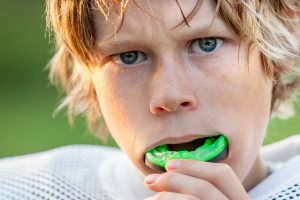 A new school year is almost here, which means you’re getting your child ready to head back to the classroom. As you shop for supplies and new shoes, is an athletic mouthguard on your little one’s back-to-school list? If your child plays sports, they need to wear one. Dental emergencies are more common than you might think. 1 in 6 Americans have one annually, and children aren’t an exception. Sports are a leading cause of dental emergencies, like chipped or knocked-out teeth. A mouthguard is a simple way to safeguard your child’s smile.
A new school year is almost here, which means you’re getting your child ready to head back to the classroom. As you shop for supplies and new shoes, is an athletic mouthguard on your little one’s back-to-school list? If your child plays sports, they need to wear one. Dental emergencies are more common than you might think. 1 in 6 Americans have one annually, and children aren’t an exception. Sports are a leading cause of dental emergencies, like chipped or knocked-out teeth. A mouthguard is a simple way to safeguard your child’s smile.
Mouthguards Prevent Oral Injuries
You wouldn’t send your little one onto the football field without a helmet. A mouthguard is equally important. It provides a protective barrier for the mouth, teeth, gums, cheeks, and jaw. Research has found it can even lessen the risk of concussions. Although mouthguards are a proven solution to prevent damage to the mouth and face, only 41% of athletes wear them.
Which Mouthguard Offers the Best Protection?
You’ll find many OTC mouthguards, but it’s best to visit a pediatric dentist for a custom-fit appliance. Every mouth is as unique as fingerprints, so a one-size-fits-all mouthguard won’t offer the best protection. It can even increase the chance of oral damage if it doesn’t fit well. OTC mouthguards that can be boiled aren’t much better. They are made of low-quality materials that won’t provide maximum protection and they may break.
Instead, contact your child’s pediatric dentist for a customized athletic mouthguard. It will be made of comfortable, durable materials. It will fit your child’s mouth like a glove. Whether they play soccer, hockey, or skateboard, your little one will have the highest level of protection.
Keep Their Mouthguard Clean
Your child’s mouthguard must be cleaned after every use to keep their teeth and gums healthy. Bacteria and plaque can accumulate on it, increasing their risk of tooth decay and gum disease if it isn’t cleaned well. It can also start to stink.
Use a soft-bristled toothbrush and mild hand soap or dishwashing liquid to clean it. Let it air dry to prevent bacterial growth. The mouthguard should be kept in its storage case whenever your child isn’t wearing it. Don’t forget to clean the storage case regularly, too.
Although the next few weeks will be busy as you prepare your child for the new school year, make time to visit their pediatric dentist. They’ll ensure their teeth and gums are healthy before they go back to the classroom and provide them with the mouthguard they need before the new season.
About Dr. Ryne S. Paulson
Dr. Paulson earned his dental degree from Creighton University and continued his education in pediatric dentistry. As a father, he understands the compassionate care young children need. If your child needs a mouthguard, request an appointment through our website or call (307) 223-8814.
